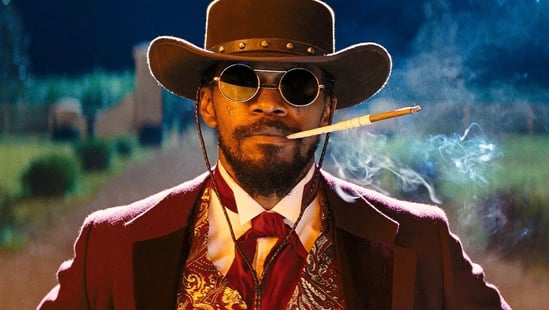Django Unchained: A Ballad of Freedom and Reckoning
Cinemapedia
Quentin Tarantino’s Django Unchained is a searing and audacious exploration of slavery, vengeance, and redemption, set against the backdrop of America’s antebellum South. Released in 2012, this Spaghetti Western-inspired epic combines Tarantino’s signature storytelling style with a provocative narrative that challenges and redefines the boundaries of historical fiction. With stellar performances, a gripping story, and a visual and auditory feast, Django Unchained stands as one of Tarantino’s most impactful works.
A Journey of Liberation and Justice
The story follows Django (Jamie Foxx), a freed slave turned bounty hunter, on a quest to rescue his wife, Broomhilda (Kerry Washington), from the clutches of the sadistic plantation owner Calvin Candie (Leonardo DiCaprio). Partnering with the charming and principled Dr. King Schultz (Christoph Waltz), Django transforms from a man bound by chains into a hero of his own making.
The narrative seamlessly blends moments of dark humor, poignant drama, and explosive action, building towards a cathartic and triumphant climax. Through Django’s journey, Tarantino crafts a tale that is both deeply personal and thematically resonant, addressing the horrors of slavery while celebrating the resilience of the human spirit.
A Bold and Brutal Landscape
Cinematographer Robert Richardson captures the American South with a striking blend of beauty and brutality. The sprawling plantations, desolate landscapes, and lavish interiors are rendered in vivid detail, serving as both a reflection of the era’s opulence and its underlying cruelty.
Tarantino’s use of color and composition enhances the film’s emotional impact, from the stark contrasts of Django’s chains against the snow to the vibrant red of blood splattering across pristine white cotton fields. The action sequences, choreographed with meticulous precision, are both thrilling and unflinching in their depiction of violence.
A Fusion of Old and New
The soundtrack of Django Unchained is a masterful blend of classic Western scores, contemporary tracks, and original compositions. Ennio Morricone’s haunting melodies sit alongside modern songs like Rick Ross’s "100 Black Coffins," creating a unique and evocative auditory experience.
Tarantino’s keen ear for music is evident in every scene, with each track amplifying the film’s tone and themes. The juxtaposition of eras in the music mirrors the film’s blending of historical and modern sensibilities, adding another layer to its rich tapestry.
Freedom, Vengeance, and Redemption
At its heart, Django Unchained is a story about freedom—both physical and emotional. Django’s journey from enslavement to empowerment is a testament to the strength of the human spirit and the transformative power of agency. The film also delves into the complexities of vengeance, portraying it as both a necessary act of justice and a potentially destructive force.
Through the character of Dr. King Schultz, Tarantino examines the morality of intervention and the weight of complicity. Schultz’s principled stance against slavery and his willingness to fight for what is right underscore the film’s call for accountability and courage in the face of oppression.
A Daring and Unforgettable Epic
Django Unchained is a bold and unflinching film that combines Tarantino’s penchant for stylistic flourishes with a deeply resonant narrative. Jamie Foxx delivers a powerhouse performance as Django, while Christoph Waltz, Leonardo DiCaprio, and Samuel L. Jackson bring complexity and depth to their roles, creating a cast of unforgettable characters.
With its audacious storytelling, stunning visuals, and thought-provoking themes, Django Unchained is a cinematic triumph that confronts the past while celebrating the enduring fight for justice and freedom. It is a film that lingers in the mind and heart, a ballad of reckoning and redemption that reaffirms the power of cinema to provoke, inspire, and transform.


